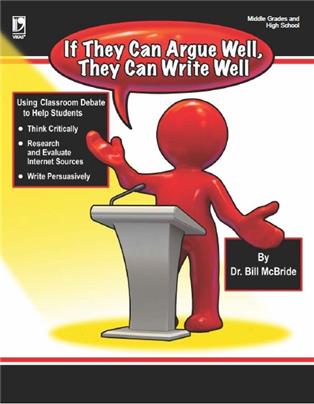
Author :BILL MCBRIDE
Price : 195.00 156.00
"Would you like your students to think logically, and invest more time and energy in their schoolwork? Would you like your students to think critically, and then structure their arguments into powerful persuasive essays? This book will help you rethink your curriculum so that critical thinking, argumentation, and standards can meet in a single, engaging format! Begin by reading the research, and then follow the carefully scaffolded instruction to teach your students to: • Argue effectively, • Research and organize information, • Think critically and analyze information, • Write well persuasively. Throughout the process students will also learn to: • Gather accurate information, • Evaluate their sources, • Take notes on both sides of an issue, • Think critically about those notes, • Rehearse their ideas in oral arguments, • Transfer the notes and ideas into an outline, • Write a persuasive essay, • Self-assess their writing, and • Correctly cite the sources they have used. If They Can Argue Well, They Can Write Well is just what you need to engage students and to assure that they develop research, speaking, and writing skills vital to their future success."
Part-1: Learning to Argue • Teacher Directions • Letter to Parents about the Lesson • Learning the Language of Debate • Grading a Persuasive Essay • Separating Fact and Opinion • Analyzing an Opinion or Claim • Identifying Opposing Arguments and Rebuttals • Reading the Research on the Death Penalty • Choosing Your Contentions • Fighting Their Counterarguments • Understanding the Steps of Debate • Taking Notes on a Debate • Choosing Your Topic to Debate, Part-2: Learning to Research • Teacher Directions • Learning the Language of Research • Using Online Reference Works • Researching with Search Engines • Practicing Boolean Searching • Evaluating a Web Site • Learning About Surveys • Conducting a Survey • Analyzing Your Data • Researching Your Topic • Researching Their Counterarguments, Part-3: Learning to Think Critically • Teacher Directions • Learning the Language of Critical Thinking • Understanding Reasoning • Recognizing Logical Fallacies • Identifying Logical Fallacies • Understanding Persuasive Techniques • Identifying Persuasive Techniques • Analyzing Bias and Loaded Language • Applying Your Critical Thinking Skills • Building a Strong Case • Planning Your Debate Offense • Building a Strong Rebuttal • Planning Your Debate Defence • Following the Steps of Debate • Taking Notes on a Debate • Evaluating Your Own Debate, Part-4: Learning to Write Persuasively • Teacher Directions • Learning the Language of Writing • Organizing Your Essay • Outlining Your Essay • Varying Your Sentences • Grabbing Your Reader from the Start • Paraphrasing, Not Plagiarizing • Revising Your Paper • Citing Your Sources, Teacher’s Final Grading and Conference Rubric
Be the first one to review
Your email address will not be published.
Your rating for this book :
S Chand And Company Limited
Building No. D-92, Fifth Floor,
Sector – 02, Noida 201301,
Uttar Pradesh (India)
1800 1031 926